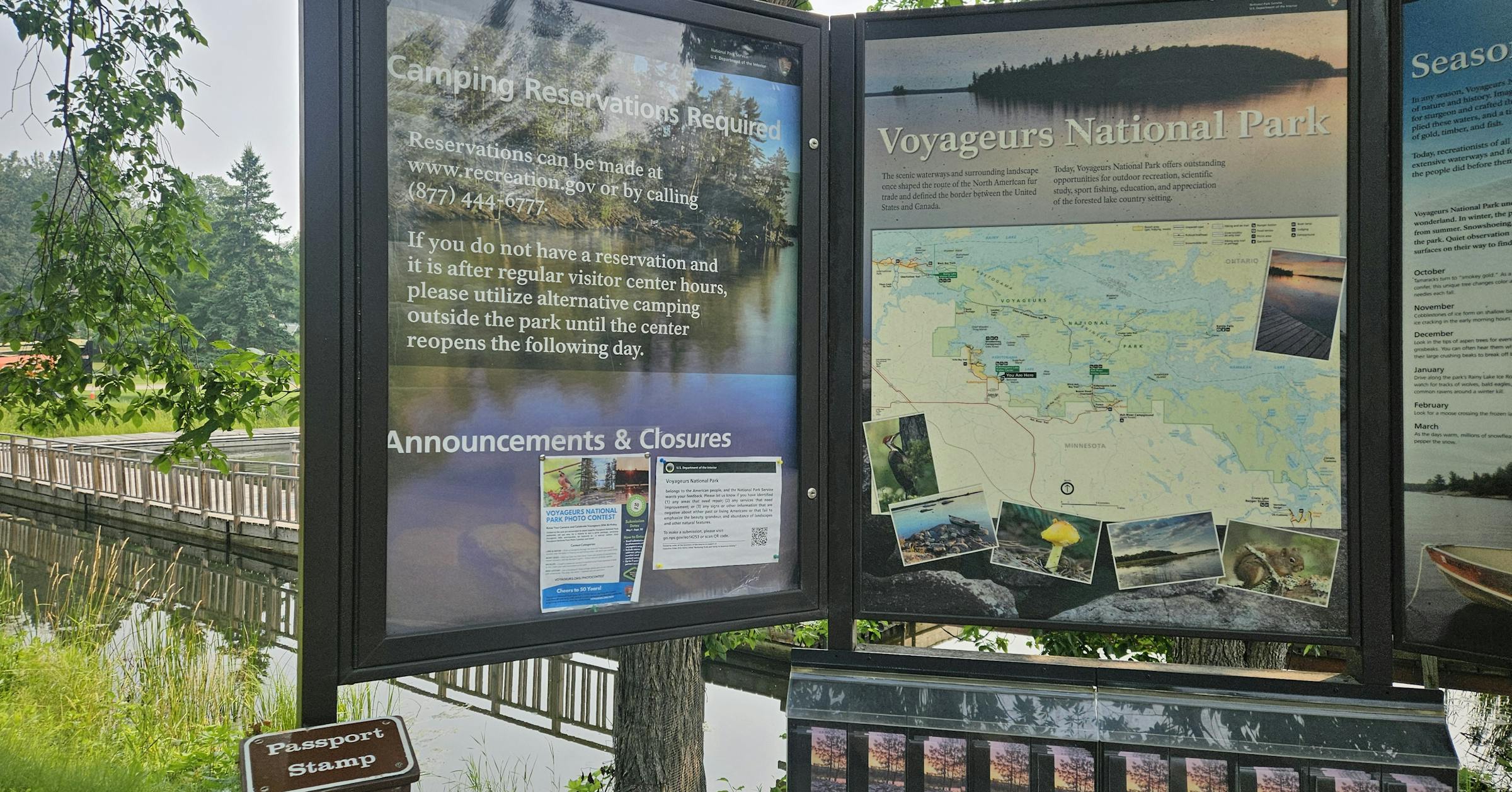National Park Service employees had to report any signs or books that could be interpreted as anti-American.
Federal officials are reviewing whether to remove books and signs with historic references to the harsh treatment of Native Americans from Minnesota’s national park sites.
An executive order issued by President Donald Trump in March required employees at all national park sites to audit and report to the Department of the Interior any material that negatively portrayed Americans, past or present, by July 18.
In Minnesota, staff reported informational signs and books that referenced forced relocations, starvation and treaty violations of Native American tribes living in Minnesota and Wisconsin, including Ojibwe, Yankton Sioux and Dakota, according to groups that work with the parks and staffers who did not want to talk for attribution for fear of losing their jobs.
“That’s very worrisome,” said Chris Goepfert, the associate director of the National Parks Conservation Association.
Goepfert was shocked last month when she stumbled across a sign at the visitors center at Voyageurs National Park in International Falls asking the public’s help in identifying anti-American material.
Similar signs were posted at other national park sites, including the Mississippi River and Recreation Area and Pipestone National Monument.
They asked visitors to alert the government “of any signs or other information that are negative about either past or living Americans” in support of Trump’s executive order called Restoring Truth and Sanity to American History.
Interior officials recently told park superintendents in a meeting that any reported materials deemed to be “inappropriate” must be covered up or removed by Sept. 18.
“Our national parks are about our history, and so for them to specifically target [and consider] removing some of our American stories, is[troubling]‚” Goepfert said.
The reported material is now under review, according to a statement on Monday from the National Park Service.
“As we carry out this directive, we are also manually reviewing and evaluating public feedback we’ve received,” the statement said. “This effort reinforces our commitment to telling the full and accurate story of our nation’s past and is not about rewriting our past.”
Tony Drews fears the possible removal of Ojibwe material.
“It’s horrible. … I don’t have enough vocabulary to properly express how this makes me feel. These are just huge steps backwards,” said the Ojibwe language teacher and founder of Nashke Native Games, a company that makes board games to teach children, plus park and museum staff the Ojibwe language.
The games are used at Voyageurs National Park and discussions are underway for their adoption at the Grand Portage National Monument.
Drews said he was inspired to teach children about their Ojibwe culture and language because of what happened to his grandmother.
“As a child, she was sent to [an Indian boarding school] and forced not to learn her language” and to give up her culture, he said.
“It feels like the momentum had been going well for our people, but this? It’s tragic,” he said, adding that he plans to reach out to U.S. Sen. Amy Klobuchar for help.
Librarians, historians and University of Minnesota data experts started a “Save our signs” campaign to document monuments, signs, books and websites to preserve any historic information that is removed. To date, the public has submitted to the campaign more than 3,000 photos nationwide, including 92 from Minnesota.
Nationwide, the lists submitted from parks to the Department of Interior for possible removal included scores of plaques and books referencing George Washington owning slaves and Franklin Roosevelt’s polio, according to the Washington Post. One book reported was “Wives, Slaves, and Servant Girls: Advertisements for Female Runaways in American Newspapers 1770-1783.”
Park employees in Minnesota and Wisconsin said they did not know what the Interior Department intended to do with the submitted lists or who would be evaluating their appropriateness.
At Voyageurs National Park in International Falls, employees who submitted three signs and 11 books to top officials only know that eventually “there’s going to be some sort of critique,” said Park Ranger Kate Severson.
“It’s bizarre, because all of our history books talk about people, and people are a mixed bag,“ she said. ”Most of our history is centered around the voyagers and the Ojibwe. And the Ojibwe have not been treated extremely well by American politicians.”
Because of this past treatment, several of the Voyageurs’ books include critiques of Minnesota politicians, which meant the staff had to report them, Severson said. They are now waiting to hear back whether they must remove them from shelves.
Ted Gostomski — a biologist at the research center in Ashland, Wis., who performs fish and wildlife studies for all of the national parks and Mississippi River and Recreation areas in Minnesota, Wisconsin and Michigan — said top park officials not only asked for employees’ and visitors’ reporting help, but were also scanning websites to look for potentially offensive language.
Gostomski, who had nothing to report at his research lab, said the exercise is confusing.
“You can’t rewrite history that way and you can’t be afraid to acknowledge and work to change things that happened in the past to make sure they don’t happen again,” he said.
Yet the Park Service said in its statement any material that disproportionately emphasizes negative aspects of U.S. history “without acknowledging broader context or national progress” can also misrepresent history.
The administration’s goal, the statement said, is to “foster honest, respectful storytelling that educates visitors while honoring the complexity of our nation’s shared journey.”

